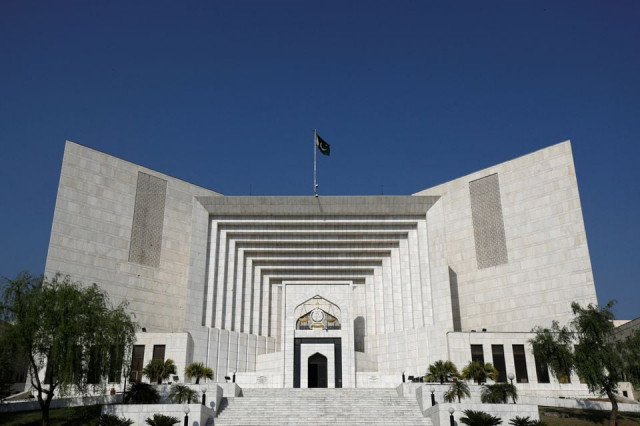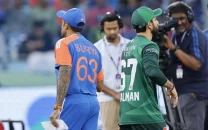Top court’s 1997 recurrence feared
After happenings in the last couple of days, crisis in the Supreme Court is deepening with each passing day

After happenings in the last couple of days, crisis in the Supreme Court is deepening with each passing day as comparisons are being drawn between the present state of affairs with the events that took place in the apex court in 1997, when the judges were passing judicial orders against each other and finally the then Chief Justice Sajjad Ali Shah was compelled to resign.
Former additional attorney general Tariq Mahmood Khokhar feared a historic recurrence.
"In 1997, a CJP was isolated and devoured by the concerted efforts of the government, the extra constitutionalists and a majority of brother judges. Then as now, a sympathetic president was of no help. The script seems familiar but there are crucial differences as more vocal lawyers, civil society, social media, Pakistani diaspora and a popular political party are gaining momentum for the CJP. Delayed elections will embolden them further," he added.
Senior lawyers appreciated CJP Bandial’s determination of holding the general elections under the Constitution.
Read more: PM orders withdrawal of 'baseless' curative review against Justice Isa
However, they believed that his legacy would not be good if the Supreme Court remained divided in the current manner.
However, a lawyer belonging to the ruling Pakistan Muslim League Nawaz (PML-N) believed that there was no comparison between the present situation with that of 1997 during former CJP Sajjad’s tenure, wherein two separate cause lists were being issued.
He said that presently, no judge wrote so far against the CJP's power that formation of benches was violative of the Constitution. However, they were questioning that the CJP’s power should be used in a manner wherein transparency was ensured.
Even the judges, who held that the CJP was a master of roster, observed that there was imbalance in exercising of suo motu jurisdiction which ought to be addressed.
The PML-N lawyer said that differences among judges started much before the incumbent government came to power.
He said that a clash had started during former chief justice Saqib Nisar’s era but that was not visible except one incident that happened at the Peshawar Registry.
He believed that the present division was between remains of Nisar and a victim of the former CJP era.
He, however, criticised the party leadership for facilitating CJP Umar Ata Bandial by approving his nomination for elevation to the Supreme Court.
Currently, the Supreme Court was visibly divided into two groups.
Read Govt hatching conspiracy to divide judiciary: Imran
It was being witnessed that except one, judges who were being elevated against the seniority principle, were standing on one side while high courts’ chief justices except two, who were elevated on the basis of seniority principle, were standing on the other.
CJP Bandial, who “is known as a balancing judge”, was facing questions from his fellow judges on account of exercising discretionary powers to form benches and fix cases.
After one month of his taking charge as the CJP, Justice Qazi Faez Isa had written a letter to Justice Bandial complaining that no senior-most judge was consulted while constituting the bench to hear the cases, on which the eyes of the entire nation were set, adding that this was troubling because it could potentially give rise to unnecessary and avoidable misgivings.
Justice Isa had also raised serious questions over the composition of a larger bench to hear the presidential reference seeking interpretation and scope of Article 63 (A) of the Constitution.
Justice Isa and Justice Sardar Tariq Masood had not been included in any bench hearing political high-profile cases during CJP Bandial's tenure.
Both judges also strongly objected to CJP Bandial nominations of junior high courts judges for their elevation to the SC.
Currently, the SC was still short of two judges.
Last year, the Judicial Commission of Pakistan members had written to CJP Bandial to summon meeting to consider the appointment of new SC judges.
It was understood that Justice Isa's case had severely affected the working of the apex court. The proceedings in the case negatively affected the relationship among the SC judges, who expressed their differences through judicial orders, speeches and letters.
In August 2021, the controversy further deepened, when one section of the SC led by incumbent CJP Bandial had withdrawn Justice Isa and Justice Jamal Mandokhail's judicial order regarding the harassment of journalists.
The same judges held that the CJP was the sole authority to invoke or assume suo motu jurisdiction under Article 184(3) of the Constitution.
Interestingly, Justice Isa and Justice Mandokhail were not included in that larger bench which was examining the legality of both the judges’ order.
However, Justice Isa while defending exercising the suo motu jurisdiction in same matter had said that he was targeted for no reason other than doing his duty.
The SC judge while issuing a notice to then acting CJP Bandial said that public perception could not be gained by simply denying that a judge of the apex court “is not targeted or persecuted”.
The current controversy started on the composition of benches couple of months ago.
On Feb 28, two judges namely Justice Isa and Justice Yahya Afridi had refused to hear cases on account of the sudden change in the composition of their benches.




1724319076-0/Untitled-design-(5)1724319076-0-208x130.webp)














COMMENTS
Comments are moderated and generally will be posted if they are on-topic and not abusive.
For more information, please see our Comments FAQ